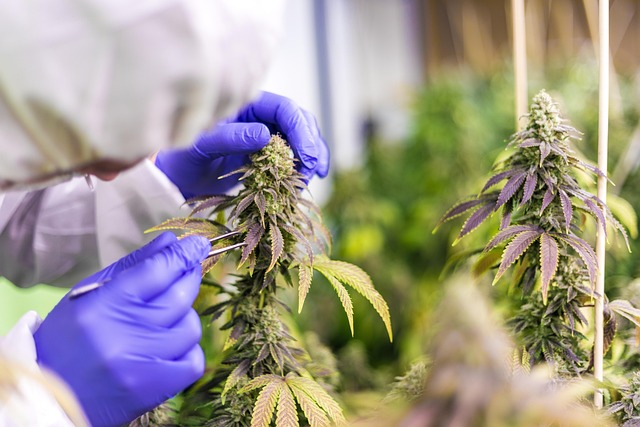Experience Natural Relief with Organic, GMO-Free THCA Rosin – Free Shipping!
Tired of artificial ingredients and unethical sourcing? Our Non-GMO THCA Rosin offers a natural, saf…….
Welcome to an in-depth exploration of GMO THCa Rosin, a compound that has sparked curiosity and debate within various industries. This article aims to unravel the complexities of this unique entity, offering readers a comprehensive understanding of its science, applications, and global impact. By delving into its history, current trends, economic implications, technological innovations, regulatory landscape, and future prospects, we will uncover why GMO THCa Rosin is more than just a chemical; it represents a potential game-changer with far-reaching consequences.
Definition:
GMO THCa Rosin, short for Genetically Modified Tetrahydrocannabinol (THC) Rosin, is a highly potent cannabis derivative produced through genetic engineering. It involves manipulating the DNA of cannabis plants to enhance or alter the production of THC, the primary psychoactive compound responsible for its characteristic ‘high’.
Core Components and Process:
Historical Context:
The concept of GMO THCa Rosin emerged from the growing demand for concentrated cannabis products with higher THC levels. Traditional cultivation methods often resulted in varying cannabinoid profiles, making it challenging to achieve consistent, potent extracts. Genetic modification offers a precise approach to enhance THC content, catering to medical and recreational markets alike. Over the years, advancements in genetic engineering have refined the process, leading to more efficient and targeted production of GMO THCa Rosin.
International Influence:
GMO THCa Rosin has captivated cannabis industries worldwide, driving innovation and shaping market dynamics. Its unique properties have sparked interest in both established cannabis markets and emerging economies. Key regions leading the way include North America, Europe, and parts of Asia, where advanced research facilities and supportive regulatory environments foster GMO cannabis development.
Regional Trends:
Market Dynamics:
The global cannabis market, valued at USD 24.5 billion in 2021 (Grand View Research), is projected to reach USD 73.6 billion by 2028, growing at a CAGR of 26.7% during the forecast period (MarketWatch). GMO THCa Rosin products are expected to play a pivotal role in this growth, especially as consumer preferences shift towards concentrated and high-potency cannabis options.
Market Analysis:
Investment Patterns:
Economic Impact:
GMO THCa Rosin has the potential to stimulate economic growth in various sectors:
Genetic Engineering Advancements:
Modern genetic engineering techniques have revolutionized GMO THCa Rosin production:
Extraction Technologies:
Digital Agriculture:
The integration of IoT (Internet of Things) devices and data analytics in cannabis cultivation is optimizing GMO THCa Rosin production. Real-time monitoring of plant growth, environmental conditions, and cannabinoid profiles enables precise adjustments to cultivation practices.
Legal Status:
The legal status of GMO THCa Rosin varies across countries and regions:
Challenges and Considerations:
Market Growth Projections:
The future looks bright for GMO THCa Rosin, with market research suggesting significant growth in the coming years. This growth is attributed to:
Research and Development:
Sustainability and Environmental Considerations:
As the cannabis industry matures, sustainability becomes a key focus:
GMO THCa Rosin represents a significant advancement in cannabis science and technology, offering both opportunities and challenges. As this compound continues to captivate industries worldwide, it is crucial to balance innovation with rigorous research, responsible cultivation, and effective regulation. The future of GMO THCa Rosin promises exciting possibilities for medical and recreational markets alike, while also demanding thoughtful consideration of its economic, social, and environmental implications.

Tired of artificial ingredients and unethical sourcing? Our Non-GMO THCA Rosin offers a natural, saf…….

Tired of spending a fortune on pet treats without seeing real results? Say hello to GMO-free THCA ro…….

Upgrade your skincare routine and say hello to a healthier, happier you with our GMO-free THCA Rosin…….

Experience the future of natural relaxation with our Delta 8 THC Rosin, a powerful and safe alternat…….

Tired of chasing relief without success? Our innovative Boost Your Wellbeing capsules, featuring pur…….

Tired of spending a fortune on prescription medications? Discover our Non-GMO THC Rosin, a revolutio…….